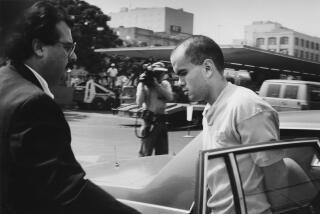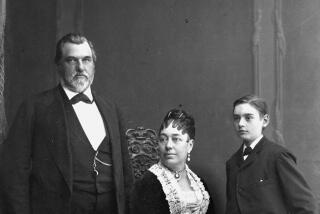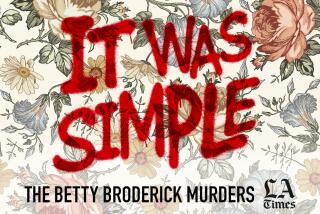Did Lizzie Do It? : You know the rhyme, but did Lizzie Borden do the crime? A century later, the debate rages on.
- Share via
FALL RIVER, Mass. — That someone whacked Andrew J. Borden and his wife, Abby, has never been in dispute. The condition of their skulls left no question about the manner in which they were dispatched from this world.
All evidence pointed in the direction of their daughter, Lizzie, but a jury took just one hour to acquit her of this most hideous of crimes. A century later, the debate over her involvement still rages.
Did she, or didn’t she?
“She didn’t,” said Paul Newcomer.
“ ‘Course she did,” countered Newcomer’s wife, Mintie.
Retired auto workers, the Newcomers drove here from their home in Plymouth, Mich., this week to attend a three-day conference commemorating the centennial of what Borden buffs regard as America’s perfect unsolved crime.
In every free moment, these 500 students of mayhem could be heard discussing their heroine in the present tense and by first name only, as if they expected her to stroll through the door at any moment. With equal fury, they argued in favor of Lizzie Borden’s guilt or in defense of her innocence.
Did she, or didn’t she?
“Yes, I think she did,” said Jules Ryckebusch, who convened this gathering of “the largest group of Borden scholars and students ever assembled.” It was also the first such official meeting of a worldwide network of Borden junkies who have kept in touch mainly through a strong and active underground network.
Their ceaseless curiosity about the Borden murders is what keeps them in contact, Mintie Newcomer explained.
“Everybody’s gotta be interested in something,” she said.
A major-league Lizzie enthusiast himself, Jules Ryckebusch seemed worried that the presence of Lizzie-look-alikes and “Ax Me Where I Come From” T-shirts might give the wrong impression of the meetings at Bristol Community College, where he teaches English. Ryckebusch was determined that this assemblage should have proper academic solemnity, and the fact that people like the Newcomers--cheerily clutching their Lizzie Borden tote bags--kept referring to the event as a “convention” made him uncomfortable.
“This is neither a festival nor a celebration of murder,” Ryckebusch announced. “It is a serious examination of a piece of history almost limitless in its psychological, social and literary implications.”
Psychologically, anyway, the 32-year-old Lizzie seemed to hit all the bases of dysfunction.
Let’s start with her father, Andrew. A mean, stingy man, he rose from undertaker to furniture dealer to bank president. He amassed a fortune that today would amount to millions. Yet Andrew Borden kept his family in a grim house in an unfashionable part of town and was too cheap to install running water or electric power.
Lizzie, it is said, longed for a grand dwelling on The Hill, Fall River’s prestige address, and a vehicle to spare her the indignity of riding the streetcar. Weeks after the trial, she bought both.
Did she, or didn’t she?
“Between you and me and the lamppost, it was a conspiracy,” said Andrew Jennings Waring, whose grandfather was Lizzie Borden’s defense attorney.
In the prosperous swirl of the Gay ‘90s, the Bordens were viewed as eccentric, repressed and restrained. They double-locked every door in the house--presumably against each other. According to Professor Joyce Williams of Indiana University, they were dysfunctional before anyone had heard of the term.
So did Lizzie do it?
“I would say yes,” Williams said.
By all accounts, Andrew Borden’s younger daughter was strange. She kept to herself and avoided the company of men. Merchants in Fall River knew her to be a shameless kleptomaniac. Between the time of her arrest and her acquittal, she told cellmates that her favorite author was Dickens--who, of course, made a heroine of a woman who liked to knit shrouds.
Destined for a perverse immortality, Lizzie impressed observers of her time with her egocentricity, her absence of remorse and her inability to maintain warm or affectionate relationships. She displayed all the ingredients of what today is known as a personality disorder.
“Lizzie Borden provides a window to an entire era because her case touches on so many explosive issues,” said Cara W. Robinson, an Oxford University graduate student who in 1990 wrote her Harvard senior thesis about the Lizzie Borden case. “Class, gender, ethnicity . . . “
Fine, great. But did she do it?
“Gee,” Robinson said. “I don’t really know.”
Lizzie detested her stepmother, Abby Durfee Gray Borden. But this may have been understandable. Andrew Borden’s second wife was snappish and cruel. She grew fatter with each passing year, to the point where one Borden scholar labeled her a “mean bowl of oatmeal.”
The mistress of the Borden house honored her husband’s miserliness by serving mutton soup, meal after meal. Because it was simpler, she referred to any servant as “Maggie,” regardless of her actual name.
On Aug. 4, 1892, her last morning on earth, Abby Borden once again ordered mutton soup to be served for breakfast. When Bridget Sullivan, the family maid, complained that she felt faint from the heat, Mrs. Borden is said to have responded by telling “Maggie” to wash the windows.
So perhaps it is not surprising that Abby Borden was the first one to be killed.
“You all know the skipping rhyme,” said Gary Earl Ross of the State University of New York at Buffalo, “so I won’t repeat it.” Then he recited it anyway.
Lizzie Borden took an ax
And gave her mother 40 whacks . . .
In truth, both Bordens took fewer than 30 whacks between them. But “certainly it was more than enough to do the job,” said Kathleen Chamberlain of Emory & Henry College in Emory, Va.
This “savagery”--the extreme violence of cleaving the Bordens’ skulls--is what leads Brown University psychiatrist Dr. M. Eileen McNamara to her theory that Lizzie did it. What else would you expect from an incest victim?
Countless other possible explanations have been put forth as well. Lizzie Borden’s legend has inspired dozens of books, poems and plays, not to mention a ballet, an opera and a movie that starred Elizabeth Montgomery. Betty Mitchell, a professor of history and women’s studies at the University of Massachusetts at Dartmouth, teaches a semester-long class devoted exclusively to the enduring enigma of the Borden case.
Did she do it?
“Oh no,” said Karen Carino, one of Mitchell’s students. “I don’t think she would do something like that.”
Among the premises floating around Bristol Community College this week was the mysterious stranger scenario, in which a dark-haired, dark-eyed man was seen lurking about the Bordens’ neighborhood. The boyfriend theory suggests that Lizzie did have a beau, David Anthony Jr., who killed the Bordens to liberate his lady love. Another scheme fingers the family physician, Dr. S. W. Bowen, as the culprit. A long-discarded notion is that Andrew Borden whacked his wife in fury over her increasing girth, and that Lizzie dutifully did in her daddy to save him the trauma of a trial.
Then there is the plot outlined by Mary Daehler Smith, a professor of English at Nebraska Wesleyan University. Smith calls Lizzie a “cut-rate Clytemnestra,” and believes that Lizzie and the maid Bridget share guilt for the crime.
None of this speculation makes life any easier, however, for “an active DAR volunteer” from Washington, named Elisabeth Borden or for her daughter, who bears the same occasionally unfortunate name.
“We almost lost our hotel reservation because they thought it was a joke,” said the daughter, who works in county government in Boulder, Colo.
“It wears a little thin,” said the mother, whose husband was a seventh cousin, twice removed, of the original Lizzie Borden.
Well, ladies, speaking as family members, did she, or didn’t she?
“I could see her doing it,” said Elisabeth, the daughter. “In 1892 she didn’t really have any other way out.”
“Now, now,” said Elisabeth, the mother. “Whether or not she did it, I’ve never felt she was a bad person.”
For her part, Lizzie Borden wasted little time in reordering her life following her parents’ death. She moved to a stately house on The Hill and bestowed up on it the mildly grandiose name of Maplecroft. She bought a car, and later--in a major gesture of daughterly defiance--hired a chauffeur. To complete her new image, she changed her name to Lizbeth.
Active in the Women’s Christian Temperance Union, Lizbeth Borden shared a sedate life at Maplecroft with her sister Emma, seven years her senior. But when Lizbeth took up a “special friendship” with a New York actress, Emma demonstrated her disapproval by moving out.
Lizzie Borden died of natural causes in 1927. She is buried in Fall River, alongside her sister and their parents.
Did she do it? Only Lizzie knows for sure.
More to Read
Sign up for Essential California
The most important California stories and recommendations in your inbox every morning.
You may occasionally receive promotional content from the Los Angeles Times.













